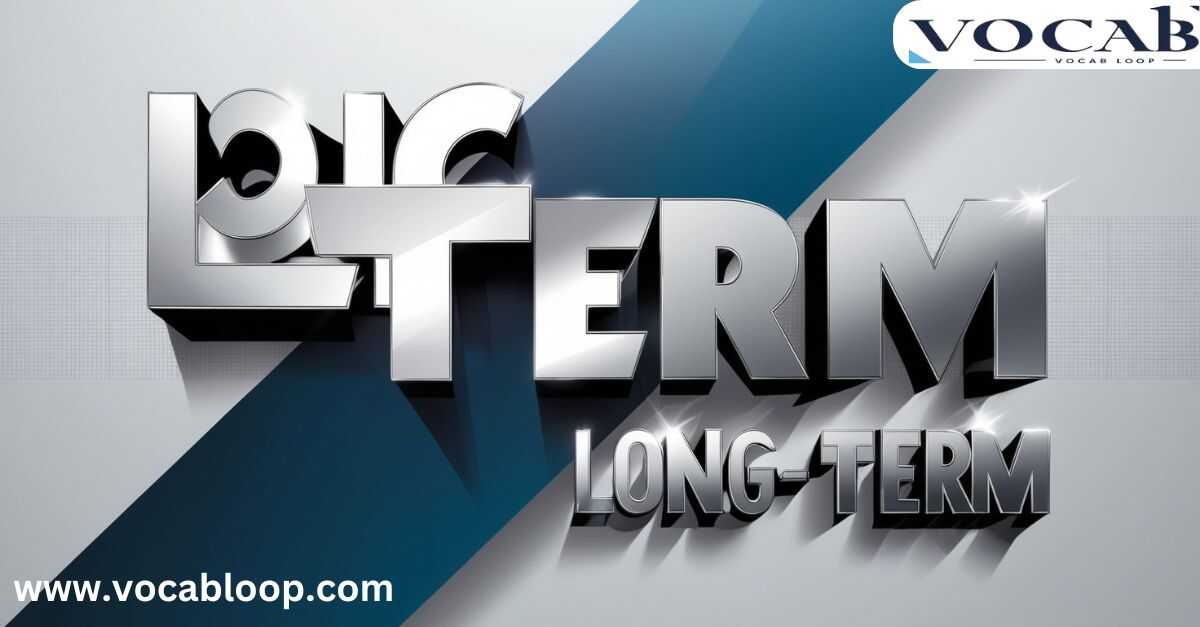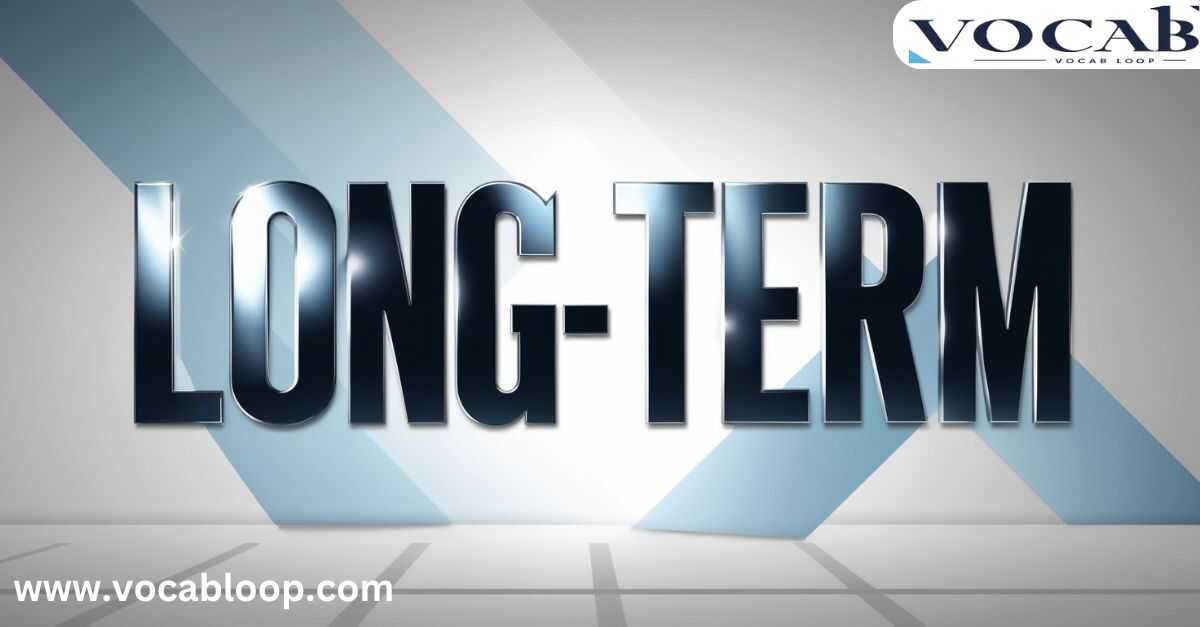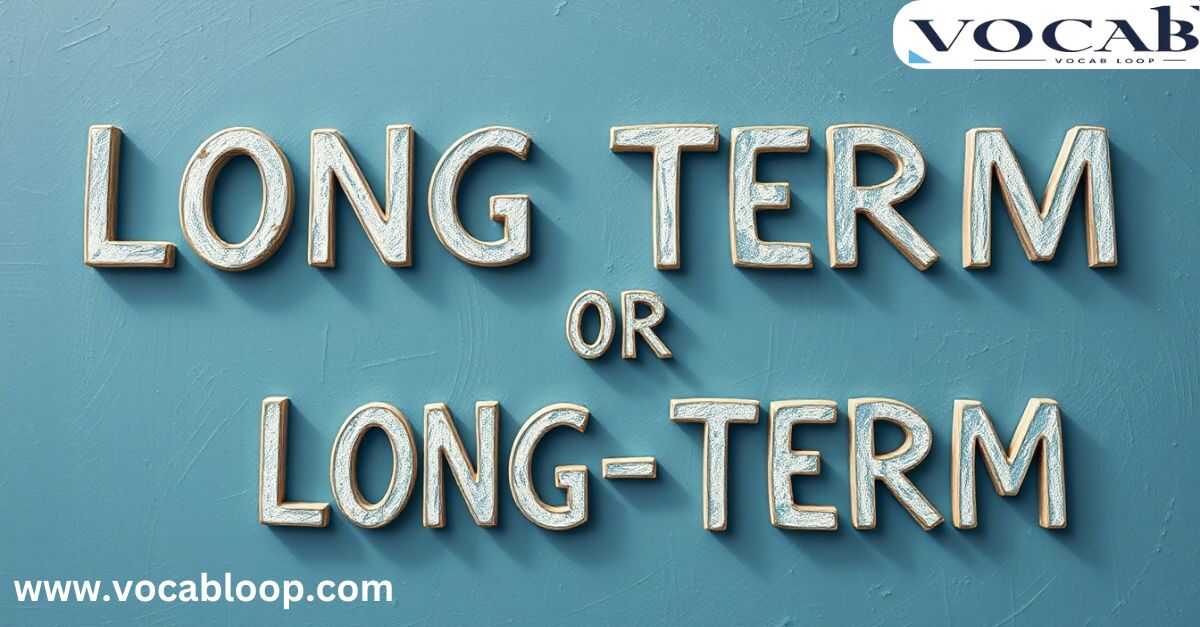In the vast landscape of the English language, few elements cause as much confusion as the seemingly simple pair: “long term” and “long–term“. This tiny hyphen, or lack thereof, packs a punch in meaning and usage, often leaving writers and speakers second-guessing their choices.
Whether you’re drafting a business proposal, penning an academic paper, or simply trying to express your thoughts clearly, understanding the nuances between these terms is crucial for effective communication.
Understanding the difference

At first glance, the difference between “long term” and “long-term” might seem negligible. However, this subtle distinction can significantly impact the clarity and precision of your writing. The root of the confusion lies in the dual nature of these phrases – one functioning as a noun phrase, the other as an adjective.
The impact on clarity in writing and speech cannot be overstated. Using the wrong form can lead to ambiguity, potentially altering the intended meaning of your sentence. For instance, consider the difference between “We’re thinking about the Distant future” and “We’re making long-term plans.” The first refers to a concept, while the second describes the nature of the plans.
Breaking Down “Long Term” (Two Words)
When used as two separate words, “long term” functions as a noun phrase. It refers to an extended period or a lengthy duration, often implying a distant future or a prolonged period of time.
Definition and usage as a noun phrase

As a noun phrase, “long term” typically follows prepositions like “in,” “over,” or “for.” It’s used to discuss a concept or a period of time rather than to describe something else.
Examples:
- “In the long term, our investments will pay off.”
- “We need to consider the Prolonged timeframe when making these decisions.”
Contexts where “long term” shines
“Long term” is particularly useful in discussions about:
- Financial planning
- Strategic decision-making
- Historical analysis
- Future projections
Decoding “Long-Term” (Hyphenated)

The hyphenated form, “long-term,” serves as an adjective. It’s used to modify nouns, describing something that lasts for an extended period or has far-reaching consequences.
Function as an adjective
As an adjective, “long-term” always precedes the noun it modifies. It helps to create compound adjectives, which provide more specific descriptions.
Examples:
- “We’re implementing a long-term strategy for growth.”
- “The patient requires long-term care.”
When and why to use the hyphen
The hyphen in “long-term” serves a crucial purpose: it links the words to form a single, cohesive unit that acts as a modifier. This hyphenation helps prevent ambiguity and improves readability.
The Outcast: “Longterm” (One Word)
While “Lengthy duration” and “long-term” are both correct in their respective uses, “longterm” as a single word is generally considered incorrect in standard English.
Is it ever correct?
In short, no. “Longterm” is not recognized as a standard form in any major style guide or dictionary. It’s likely a result of confusion or a typographical error.
Common misconceptions
Some writers might use “longterm” thinking it’s a more concise or modern form. However, this usage can make your writing appear less professional or less informed about proper grammar and style.
Grammatical Showdown: “Long Term” vs. “Long-Term”
Understanding the grammatical roles of these phrases is key to using them correctly.
Parts of speech and their roles
| Form | Part of Speech | Role in Sentence |
| Long term | Noun phrase | Subject, object, or complement |
| Long-term | Adjective | Modifier of a noun |
Impact on sentence structure and meaning
The choice between “long term” and “long-term” can significantly alter the structure and meaning of a sentence:
- “We’re focusing on the Extended period.” (noun phrase, object of the preposition)
- “We’re developing Lasting solutions.” (adjective, modifying “solutions”)
American vs. British Usage

While the basic rules for “Long term” and “long-term” are consistent across English variants, there are some subtle differences in preference and style.
Preferences across the pond
American English tends to be more liberal with hyphenation, often using it to clarify meaning in compound modifiers. British English, on the other hand, may be more sparing with hyphens, especially in well-established phrases.
Style guide recommendations
| Style Guide | Recommendation |
| Chicago Manual of Style (US) | Use “long-term” as an adjective before nouns; “Lengthy duration” as a noun phrase |
| Oxford Style Manual (UK) | Similar to Chicago, but may allow unhyphenated form in some established phrases |
The Business of Time: “Long Term” and “Long-Term” in Corporate Speak
In the world of business, precision in language can make or break deals and strategies.
Industry-specific usage
Different sectors may have their own conventions:
- Finance: Often uses “Extended timeline” when discussing investment horizons
- Healthcare: Frequently employs “Lasting” in patient care contexts
- Technology: May use both forms when discussing product lifecycles and strategic planning
Financial and strategic implications
In financial reports and strategic documents, the correct usage of these terms is crucial:
- “Our Lasting goals” implies objectives set for an extended period
- “In the Distant future, we expect to see returns” discusses a future timeframe for results
Synonyms

To avoid repetition and add variety to your writing, consider these alternatives:
Alternatives for “long term” (noun phrase)
- Extended period
- Lengthy duration
- Distant future
- Prolonged timeframe
- Extended timeline
Substitutes for “long-term” (adjective)
- Enduring
- Lasting
- Sustained
- Chronic (in medical contexts)
- Persistent
Context Clues: Examples in Action
Let’s examine how these phrases work in real-world sentences:
“Long term” in sentences
- “In the Distant future, renewable energy sources will become more cost-effective.”
- “We need to think about the Distant future when planning our retirement savings.”
- “The Distant future effects of climate change are still being studied.”
“Long-term” in real-world writing
- “The company is implementing a Lasting growth strategy.”
- “Patients with chronic conditions often require Lasting care.”
- “Our Lasting goal is to expand into international markets.”
The Evolution of Time: Origins and Etymology
The concept of “Distant future” and its variations have evolved alongside our understanding of time and planning.
Historical usage of “long term”
The phrase “Distant future” has its roots in financial and economic discourse of the late 19th century. It was initially used to describe bonds and investments that matured over extended periods.
Development of the hyphenated form
The hyphenated “Lasting” emerged as writers sought to clarify the adjectival use of the phrase. This evolution reflects a broader trend in English towards using hyphens to form compound modifiers.
Mastering Time-Related Terminology
To use these phrases effectively, keep these tips in mind:
Tips for choosing the right form
- Ask yourself: Am I using this as a noun or to describe something?
- If it’s before a noun and modifying it, use “long-term”
- If it’s standing alone or after a preposition, use “Distant future”
Common pitfalls to avoid
- Don’t use “longterm” as one word
- Avoid mixing forms within the same document for consistency
- Be cautious with automatic spell-checkers, which may not distinguish between the forms correctly
Beyond the Hyphen: Other Tricky Time-Related Terms
The “Lengthy duration” vs. “long-term” debate is just one example of time-related terminology challenges:
Short-Phrase vs. short Phrase
Similar rules apply: “short-Phrase” as an adjective, “short Phrase” as a noun phrase.
Medium-Phrase vs. medium Phrase
Less common, but follows the same pattern as long and short Phrase.
The Future of “Long Phrase” and “Long-Phrase”
Language is ever-evolving, and these terms are no exception.
Shifting language trends
With the rise of digital communication and informal writing, we may see a relaxation of hyphenation rules in some contexts.
Predictions for usage evolution
While formal writing will likely maintain the distinction, informal usage might become more flexible. However, in professional and academic contexts, precision will remain crucial.
FAQs
Can “long-term” ever be used at the end of a sentence?
Yes, but it’s rare. Typically, “long-term” is used as an adjective before a noun. However, in some informal contexts or when the noun it modifies is implied, you might see something like:
“Our goals are focused on the long-term.”
What is the rule for using hyphens in general with compound adjectives?
A hyphen is used in compound adjectives when the modifier precedes the noun it describes, and the combination could cause ambiguity without the hyphen. For instance:
- With hyphen: “a long-term plan” (modifies “plan”)
- Without hyphen: “the plan will work in the Lengthy duration” (noun phrase).
Do other languages have similar distinctions for time-related terms?
Many languages handle time-related concepts differently. For example, French uses “à Lengthy duration” (noun phrase) and “de Lengthy duration” (adjective), maintaining a clear distinction. Similarly, German employs “langfristig” as an adjective and “auf lange Sicht” for the noun phrase.
Why do style guides emphasize consistency in hyphenation?
Style guides stress consistency because switching between “Lengthy duration” and “long-term” improperly can confuse readers. Using the forms correctly and consistently ensures clarity, professionalism, and alignment with established grammatical standards.
Are there specific rules for capitalization when using “long term” or “long-term” in titles?
In title case, hyphenated forms like “Long-Term” capitalize both parts. For example, “The Importance of Long-Term Strategies.” However, if “Lengthy duration” is used as a noun phrase in a title, only the first word would be capitalized unless it’s at the start:
“In the Long Term: A Study of Trends.”
Conclusion
The distinction between “Distant future” and “Lasting” might seem minor, but it’s crucial for clear communication. Use “Distant future” as a noun phrase when referring to an extended period, and “Lasting” as an adjective to describe something lasting a prolonged duration.
By mastering this subtle difference, you’ll enhance your writing’s clarity and professionalism. Remember, in language, even a tiny hyphen can make a big impact on meaning.

Alex Hormozi is a seasoned blogger at Vocab Loop, known for his deep insights into language, vocabulary, and grammar. With years of experience in writing, Alex shares practical tips and effective strategies to help readers improve their linguistic skills and enhance their writing abilities.

